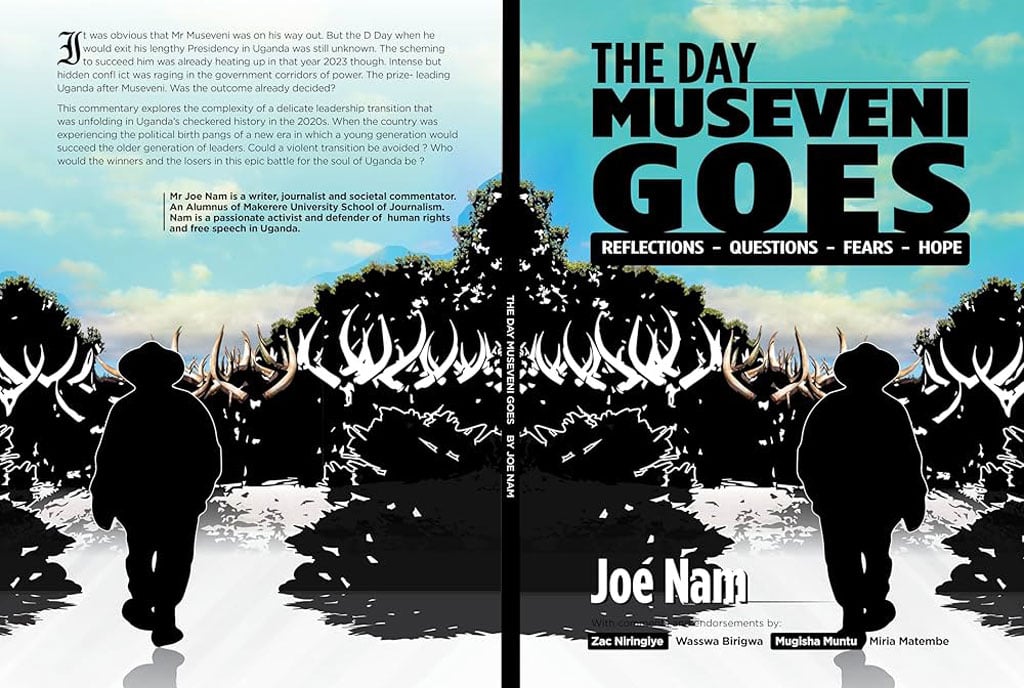
Gen Katumba Wamala congratulates Phillip Luswata (right) upon winning a Lifetime Achievement Award during a past film festival gala. PHOTOs/courtesy
Last week, the Uganda Communication Commission’s Uganda Film Festival (UFF) announced the nominees for this year’s edition of the festivities.
Most of the time, the festival opens a busy season for the Ugandan film fraternity and for over a month, corporate companies, influencers and ordinary Ugandans seem to be plugged into what is happening with the industry.
However, this is never long lived; sometimes it looks like the festival also closes the film season. Besides a few films that premiere and TV series, there is usually so little for people to talk about when it comes to Ugandan films.
Thus, when the nominations were released, it was clear most Ugandans were looking for Prestige, Sanyu, JDC, Damalie, and Beloved, the TV series they watch, rather than feature and short films.
Every year, when the festival is on, a sizeable number of Ugandans, usually those close to filmmakers, experience Ugandan stories for the first time, but the question that is persistent is where can they see local films, especially if they don’t come to festivals?
Where are the films?
It is a question that is not only persistent in Uganda; however, Africa as a continent struggles to create a sustainable film industry, where the box office truly supports the creation of more films with profit; thus, most of the best brains in filmmaking usually depend on grants to tell stories.
In fact, with the exception of Nigeria, where the box office has changed the lives of independent filmmakers, in Uganda, Kenya, Tanzania, or Senegal, the story is still different. These countries may all have something in common, they have amazing filmmakers, yet the locals and the possible audience rarely get a chance to see this brilliance.
In countries such as South Africa, most locals rarely go out to see South African films in the cinema, but at least, the country is one of the many that have benefited from streaming video on demand services such as Netflix, Max, Amazon Prime, and Disney Plus venturing into the African market. Alongside the MultiChoice Africa owned Showmax, these markets have the option of dropping new films on these platforms. Uganda, on the other hand, only has two films on Netflix, The Girl in the Yellow Jumper and the short film Katera, both by Loukman Ali.
With streaming out of the window, most filmmakers have to make their money through direct exhibitions, such as cinemas.
Cinema culture
Uganda, however, has a poor cinema culture, mainly because piracy is deeply ingrained in our entertainment consumption patterns.
According to Akram Juuko, marketing and public relations manager at Century Cinemax Uganda, there is no film infrastructure, which complicates film exhibitions for many filmmakers.
“There is no middleman to act as a distributor to bridge the gap between the producer and the cinema. Filmmakers come to cinemas directly, which in the long run is expensive,” he says.
Juuko says that during the festival, UCC plays the role of a distributor, reaching the cinemas on behalf of producers.
“At the moment, the problem is that the industry doesn’t have a distributor, and no one seems to be stepping in to play that role,” he says.
At the moment, without clear distribution channels, when filmmakers have to premiere a film, they deal with the cinema and later book it as a space. In such an arrangement, it means that if a film fails to sell out, the producer will directly take the hit.
With a distributor, though, the producer could have an agreement with the distributor, and in the same way, the distributor will have another agreement with the cinema. In this case, it means that promotion and marketing are in the hands of the distributor, as the producer concentrates on making art.
“At the moment, the cinema has its doors open for any possible partner,” Juuko says.
Efforts
At the moment, the cinema has partnered with UCC in what they call the UCC Movie Night. The night takes place at all Century Cinemax branches at Arena Mall, Acacia Mall, and Metroplex Nalya. The night exhibits a different film every Wednesday, Thursday, and Friday.
The initiative is aimed at giving local films an opportunity to exhibit in a cinema setting while giving Ugandans a place and time to watch the films.
The problem with the night is that it happens on specific days. This means that unlike Hollywood films that have a weekly cinematic run of seven to 10 or more days, each Ugandan film has just a day and is in a single location.
This doesn’t make a lot of financial sense.
Doreen Mirembe knows a thing or two about keeping a film in cinema for a week. Her film Kafa Coh, alongside Sabotage and 27 Guns, is one of the few Ugandan films that enjoyed a cinematic run.
“Ugandans are not cinema people, they were more into theatre at the time, but it has been struggling of late. So many of them still look at cinema as a new thing. Those that already love cinema expect a certain quality that Ugandans are not giving them,” she says.
Mirembe says that it takes a lot of time and budget for a Ugandan to put together a film that people in Hollywood can appreciate and pay for.
“When we did Kafa Coh, there was a lot we had to put into consideration, like the locations and cameras we were going to use; most people don’t have what it takes financially,” she says.
Besides that, she says that at the time theatre was thriving, they had spaces in places where ordinary Ugandans worked and enjoyed their free time.
With the festival gala taking place on June 7, the hope is that this will not be the final time Ugandans will hear about the winning films, but a time to draw solutions that last.







